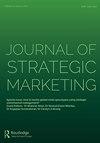一种消费者共享奢侈服务的类型
IF 3.1
Q2 BUSINESS
引用次数: 0
摘要
【摘要】共享经济的指数级增长导致了新形式的奢侈服务和体验的出现。共享奢侈品服务和体验的兴起使消费者能够接触到新的、数字化的、共享的奢侈品形式,从而挑战了传统奢侈品消费的DNA。虽然之前的研究迄今为止调查了消费者对新型液态奢侈品的看法,但对参与共享奢侈品服务和体验的消费者的类型和特征知之甚少。本研究旨在回答以下研究问题:谁是这些消费者,他们的特点,动机和态度是什么?我们深入研究了805名美国消费者在共享奢侈品服务环境下的不同动机和行为特征。通过聚类分析,我们发现了共享奢侈品消费者的四个主要集群:奢侈品放纵者、卓越驱动的传统主义者、价值追求者和社区参与者。我们描述了每个集群对共享奢侈品服务的不同特征、动机和态度,并为共享奢侈品供应商以及希望进入这个快速增长市场的传统奢侈品营销人员提供了理论和管理启示。关键词:共享经济集群分析奢侈品服务消费者类型披露声明作者未报告潜在利益冲突。补充材料本文的补充数据可在https://doi.org/10.1080/0965254X.2023.2262472Additional information网站在线获取。本文章由计算机程序翻译,如有差异,请以英文原文为准。
A typology of consumers sharing luxury services
ABSTRACTThe exponential growth of the sharing economy has led to the emergence of new forms of luxury services and experiences. The rise of shared luxury services and experiences challenges the DNA of traditional luxury consumption by enabling consumers to tap into new, digitalized and shared forms of luxury. While previous research has hitherto investigated consumers’ perceptions of new forms of liquid luxury, little is known about the types and characteristics of consumers who engage in shared luxury services and experiences. This research aspires to answer the following research questions: who are these consumers and what are their characteristics, motives, and attitudes? We delve deeper into the different motivational and behavioral characteristics of 805 US-based consumers in a shared luxury service context. Through a cluster analysis, we uncover four main clusters of shared luxury consumers: Luxury indulgers, excellence-driven traditionalists, value seekers, and community engagers. We delineate each cluster’s different characteristics, motivations, and attitudes towards shared luxury services and offer theoretical and managerial implications for shared luxury providers as well as traditional luxury marketers who wish to tap into this fast-growing market.KEYWORDS: Sharing economycluster analysisluxury servicesconsumer typology Disclosure statementNo potential conflict of interest was reported by the authors.Supplementary materialSupplemental data for this article can be accessed online at https://doi.org/10.1080/0965254X.2023.2262472Additional informationFundingThis work was supported by the American University of Sharjah [FRG19-M-B39]
求助全文
通过发布文献求助,成功后即可免费获取论文全文。
去求助
来源期刊

Journal of Strategic Marketing
BUSINESS-
CiteScore
9.20
自引率
7.30%
发文量
43
期刊介绍:
Journal of Strategic Marketing publishes papers on key aspects of the interface between marketing and strategic management. It is a vehicle for discussing long-range activities where marketing has a role to play in managing the long-term objectives and strategies of companies. The objectives of the Journal are as follows: 1.To bridge the disciplines of marketing and strategic management, and to address the development of knowledge concerning the role that marketing has to play in the management of strategy. 2.To provide a vehicle for the advancement of knowledge in the field of strategic marketing and to stimulate research in this area. 3.To consider the role of marketing as an orientation of management at the strategic level of organizations.
 求助内容:
求助内容: 应助结果提醒方式:
应助结果提醒方式:


